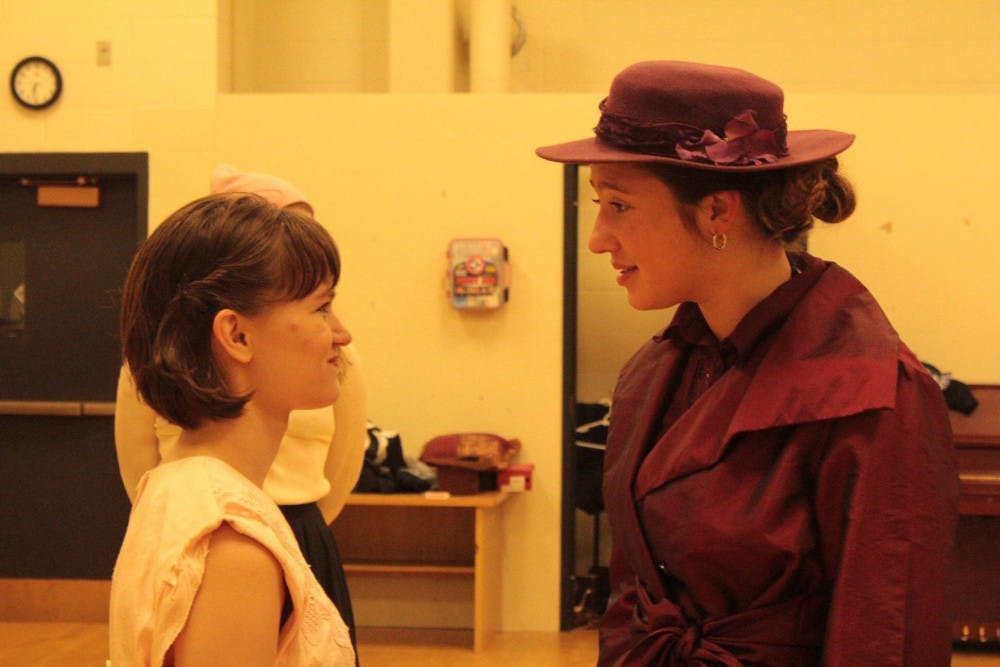Libby Walker has to keep her emotions ready to change at any moment.
In order to properly play her character, she has to be able to break down and cry at the flip of a switch.
Walker, a junior theater major, has been working on her acting fluidity for months. She was casted as the lead in the UB Theatre and Dance production of “The Cherry Orchard.”
Walker plays Madame Lubov Ranevskaya, a landowner and emotionally stunted aristocrat who struggles with reality. The character has to deal with her intense focus on materialism in order to fill the void of her deceased son. This causes her to disassociate from the reality of her cherry orchard being sold.
“This role has been a challenge in the best of ways. I love playing someone who has so many layers. She has to go through so many struggles. When a mother loses a son, that’s something no one can understand. There are moments where people can’t relate to that kind of pain.” Walker said.
“The Cherry Orchard” has decades worth of significance within the theater community. It is highly regarded as a 20th century classic and continuously influences other popular playwrights. The production adds a commentary about social change, identity and the subversion of expectations. Although the play originally debuted in 1904, these themes are still prevalent in modern society.
The story is often regarded as both a comedy and a tragedy. The dialogue is full of dark humor, which contrasts the melancholic plot.
“The story is definitely character-driven instead of story-driven. The story is intertwined but without the characters, it wouldn’t have the same effect,” Walker said.
“I’d definitely consider the play a comedy over a tragedy. My character has to deal with a crazy amount of trauma and problems, but that doesn’t mean there can’t be humor. Some of the dialogue is just plain hysterical and it comes from the characterization.”
Walker’s character jumps between aristocratic euphoria and deep, dissociative depression. She is constantly teetering on the edge of another depressive episode. The concept of grief and the use of coping mechanisms are uniquely touched upon within the story. Ranevskaya is able to distract herself from her pain by throwing lavish parties and other privileged amusements.
“I hope the audience ends up liking my character despite her denial. I hope that they understand her layers. It’s important to ask how does it feel when you love so much you let them go. What does it mean to people? How do you let go?” Walker said. “When I’m in character, I have to remember these layers. I have to understand the concept of being completely in denial.”
But the audience has to decide for itself whether or not it understands the emotional toll and sacrifice being made with the sale of the cherry orchard. Although the sale will hurt Ranevskaya and the audience has witnessed her emotional state and the impact of her existing trauma, the sale will pull her out of debt.
“In life there’s moments where we don’t want to believe the truth because we’ve gone through so much,” Walker said. “What do you do when the one thing you love is gone? The one thing that’s keeping you going, that balances everything together.”
Many characters want to help Ranevskaya with her denial and her other problems.
Lucian Visone, a junior theater major, knows how difficult it is to lead a production with such a significant background. Visone plays opposite Walker as Yermolai Alexeyitch Lopakhin, another wealthy character who has to fight against societal pressure as a representative of the middle class.
“I started doing research in the middle of summer. [I was] looking into the time period, themes, differences in the core attributes of each character and how they all contrast with each other. I was terrified by this role because of how large it was,” Visone said. “I kept pushing myself at night, to the point of pushing myself too hard and losing sleep over the show.”
The emotionally driven production offers a compelling look into the relatability of grief. The show is sure to bring both laughs and tears to the audience.
The production will have a short run from Nov. 2 to Nov. 4 in the Katharine Cornell Theatre.
Samantha Vargas is the asst. arts editor and can be reached at samantha.vargas@ubspectrum.com and on Twitter @SamVargasArts
Samantha Vargas is an English/ film studies double major with a minor in media study. She spends her free time finding shows around buffalo and hanging out with her cat.






